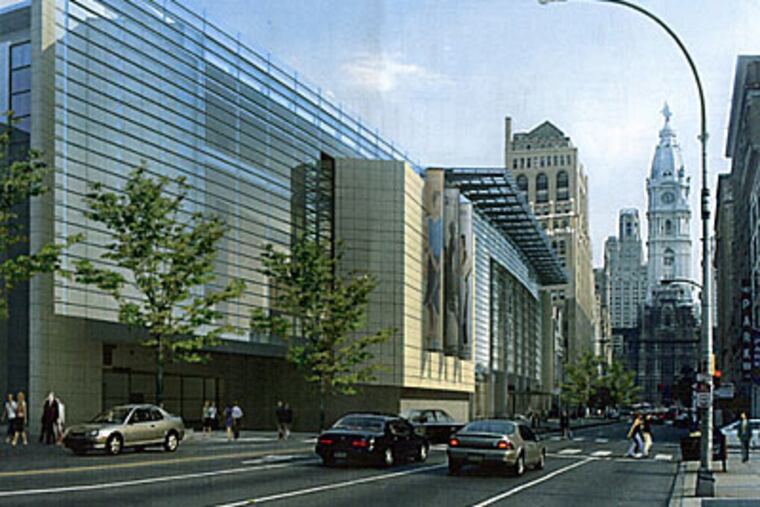Convention Center's high costs draw notice
The planned expansion is "getting to the point where the cost will outweigh the benefit," Rendell said.

The projected cost of expanding the Convention Center is nearly $100 million over budget, and Gov. Rendell wondered aloud yesterday whether the massive project, now dangling an $800 million price tag, was still worth it.
"You're getting to the point where the cost will outweigh the benefit," Rendell said. "You're not there yet, but you're getting to the point."
Last month, The Inquirer reported that the first phase of the project was at least $20 million over what was expected, because of soaring steel and concrete prices.
Officials now acknowledge that projections show the rapidly surging prices of those commodities, as well as copper and aluminum, may push construction costs considerably higher than the budgeted $700 million.
Asked how large the gap might be, outgoing Convention Center president Al Mezzaroba said yesterday, "The estimate we have right now is $90 million."
Rendell, in an interview, said he believed the shortfall might be even bigger, since bids from the myriad subcontractors working on the expansion have yet to be received.
Efforts to build a bigger center - the current building opened in 1993 - began early this year, and demolition work is nearly complete. The project is expected to be finished in 2011, and conventions have been booked for that year.
Last summer, state lawmakers, with some reluctance, approved using $700 million in revenue from slot-machine parlors to pay for its construction. Yesterday, Rendell said the legislature was unlikely to OK a dime more.
"There's no appetite in Harrisburg to go back and do more than $700 million. Even I wouldn't ask," he said.
Rendell's comments came moments before he signed legislation that would allow the city to impose a "hospitality promotion tax" of up to 1.5 percent, which would raise hotel-room taxes to 15.5 percent.
Some of that revenue - City Council will decide how much in the fall - would be directed to the Convention Center to make up for the shortfall.
"The expansion is constantly in peril because of increasing costs," Rendell told dozens of regional tourism and hotel executives during a news conference celebrating the bill's passage. "Without those extra [hotel-tax] dollars, I'm not sure we have an expansion of the Convention Center."
But those dollars may not be enough.
Rendell said he had asked the city to chip in as much as $5 million a year for at least 20 years. "The city is probably going to have to dip into its capital budget," Rendell said. "I talked to the mayor. He hasn't said yes yet."
Of Rendell's request, Mayor Nutter yesterday said: "We're still in an active conversation about what the needs are."
But the mayor tried to quash any doubts about the worthiness of the expansion. "The Convention Center is the centerpiece of completing the revitalization of North Broad Street. It's not just a building," Nutter said.
The expansion will increase the space that can be rented for conventions, trade shows and other events from 624,000 square feet to 1,000,000 square feet by extending the building to Broad Street between Arch and Race Streets. It now covers the areas between 11th, 13th, Arch and Race Streets, with a wing extending over the Reading Terminal Market and connecting to Market Street.
Convention Center Authority chairman Buck Riley said the amount of the shortfall would become clearer in mid-August, the bid deadline for the next phase of construction.
He also said it was possible money would be left over from funds allocated to acquire land where the expansion is being built. Those expenditures may be more certain in the next three to four months, he said.
What is certain, Riley said, is that nothing is left to trim from the new building to save money. "We are down to the point where there is nothing that can be pulled out of the plans without starting to hurt the quality of the Convention Center," Riley said.
Besides creating construction jobs, officials expect the project, when completed, to lure tens of thousands more conventioneers who would spend money in Philadelphia hotels, restaurants and shops.
"It would be inappropriate to stop a project of this magnitude with that much benefit to the city over a difference of $90 million in the scope of a $790 million project," said City Councilman Jim Kenney.
Noting that the city's only existing financial obligation to the expanded center is a $15 million annual contribution, Councilman Bill Green said, "For us, it makes great sense. . . . We'll have all these extra additional conventions and tourists here spending money in the city."